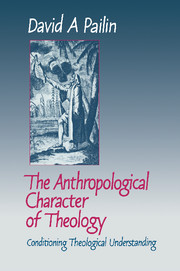Book contents
- Frontmatter
- Contents
- Preface
- 1 INTRODUCTION TO A STUDY OF THEOLOGY
- 2 FAITH, BELIEF, THEOLOGY AND REASON
- 3 GOD AS COSMIC PROJECTION
- 4 GOD AS ACTUALIZING REGULATIVE IDEAS
- 5 THEOLOGY AND RELIGIOUS EXPERIENCE
- 6 THEOLOGY AND THE APPREHENSION OF REVELATION
- 7 THEOLOGY AND HUMAN NEED
- 8 THEOLOGY AND THE COMPLETION OF UNDERSTANDING
- 9 CONCLUSION
- Notes
- Select bibliography
- Index
8 - THEOLOGY AND THE COMPLETION OF UNDERSTANDING
Published online by Cambridge University Press: 26 August 2009
- Frontmatter
- Contents
- Preface
- 1 INTRODUCTION TO A STUDY OF THEOLOGY
- 2 FAITH, BELIEF, THEOLOGY AND REASON
- 3 GOD AS COSMIC PROJECTION
- 4 GOD AS ACTUALIZING REGULATIVE IDEAS
- 5 THEOLOGY AND RELIGIOUS EXPERIENCE
- 6 THEOLOGY AND THE APPREHENSION OF REVELATION
- 7 THEOLOGY AND HUMAN NEED
- 8 THEOLOGY AND THE COMPLETION OF UNDERSTANDING
- 9 CONCLUSION
- Notes
- Select bibliography
- Index
Summary
Theology has traditionally been described as ‘the queen of the sciences’. For Thomas Stackhouse this meant that it is ‘the Perfection of all other Knowledge’, and, consequently, that those who study it need to be competent in practically all aspects of ‘human learning’. It was a forbidding agenda for a would-be theologian in his day. Today the growth of knowledge makes it impossible for any one person to satisfy it. On the other hand, as we are to consider in this chapter, the current state of knowledge conditions any theology which is intended to be taken seriously as a way of understanding, since it provides data which it must take account of, if not actually incorporate.
The ‘queen of the sciences’, God and the world
Stackhouse defends the superiority and certainty of theology by the traditional argument. This is based on two premises, that theology expresses what God reveals and that God cannot err. Although the second of these premises, affirmation of the infallibility of divine knowledge, seems unquestionable, the first one, that theology expresses what God reveals, is not convincing. As has been discussed previously, in practice both the identification and the apprehension of the contents of alleged revelations are conditioned by our present ways of thought. Hence references to revelation have to be justified by reasoned arguments rather than accepted as standards for true understanding.
Theology's claim to be the highest form of understanding may, however, be justified on the grounds that its primary object is the ultimate in being, rationality and value. It is concerned with what is final, even though its discussions of it are conditioned and provisional.
- Type
- Chapter
- Information
- The Anthropological Character of TheologyConditioning Theological Understanding, pp. 163 - 194Publisher: Cambridge University PressPrint publication year: 1990



